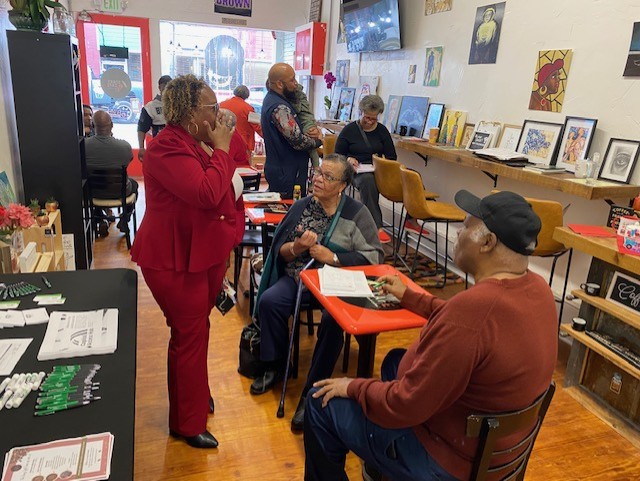![ACC-CDFI-v1[green]](https://appalachiancommunitycapitalcdfi.org/wp-content/uploads/2025/04/ACC-CDFI-v1green.png)
This success story is part of ACC’s series titled CDFI Innovations: How CDFIs Are Fueling Small Business Growth
CDFI: Bridging Virginia in partnership with the Metropolitan Business League
CDFI Service Area: Bridging Virginia – all of Virginia with offices in Richmond and Hampton Roads; Metropolitan Business League – statewide with offices in Richmond, Petersburg, and Hampton Roads, Virginia
The Capital Access Hub coordinates partners and resources from Virginia’s financial ecosystem so that small business owners can easily navigate the options and find what they need to start up and grow at any phase of their entrepreneurial journeys.
“After years of going to stores in search of products for my kinky hair with little to no luck, I realized that I wanted to pursue my dream of opening a Beauty Supply Store, I pitched my idea to my family and began to build from there.”
– Tawann Scott, Marie’s Hair & Nail Supply
Tawann Scott always dreamed of being a business owner and focusing on something she’s passionate about. With perseverance, she was able to open the doors to Marie’s Hair & Nail Supply in October 2021.

Former MBL Capital Access Manager Sharon Anderson-Grooms shares information with small business owners in Lawrenceville, Virginia about MBL programs, Kiva loans, and Bridging Virginia loans. Credit: MBL.
Following the major milestone of her grand opening, Tawann was connected with the Metropolitan Business League (MBL). The MBL helped her secure an $8,500 loan through Kiva, an online lending platform offering crowdfunded microloans to entrepreneurs and small business owners in underserved communities around the world. Building on that momentum, Tawann began working with the Capital Region Small Business Development Center (SBDC) to get technical assistance for her business and identify additional funding opportunities.
SBDC staff began by updating Tawann’s Quickbooks account, which included organizing accounts and categorizing transactions dating back to the business’ opening. That gave her with the documentation she needed to secure a $10,000 loan from Bridging Virginia. The SBDC then provided further assistance with marketing, which led to Tawann renting space in the store to two additional stylists and expanding Marie’s offerings.
Tawann’s journey was supported by the Capital Access Hub. The Hub is a collaborative effort between Bridging Virginia, the MBL, and other partners that aims to close the capital access gap for historically marginalized and underinvested small businesses through a combination of early-stage capacity building, technical assistance for capital access, and network growth.
The idea for the Capital Access Hub emerged through conversations among Bridging Virginia and MBL staff, who recognized that they each have complimentary specializations. MBL is a membership-based association with a strong and active network of members who have access to technical assistance and training, networking, and mentorship. For example, MBL offers the Kauffman FastTrac® program, the Veterans Entrepreneurship Training program, a variety of youth entrepreneurship programs, and more. Upon completing these programs, entrepreneurs are better prepared to attract and use capital, and in some cases, are approved for higher loan amounts.
The MBL is also a Kiva trustee – an organization that endorses small business owners and entrepreneurs in their community, helping them to qualify for Kiva’s 0% interest, fee-free loans. The MBL uses its local knowledge to identify suitable borrowers, provides support throughout the loan process, and helps to fundraise by sharing the borrower’s profile within its networks. Kiva loans can range from $1,000 to $15,000.
Bridging Virginia picks up where MBL leaves off, offering microloans of $15,000 to $50,000 to existing businesses with a history of positive cash flow. This was an intentional choice, to ensure that the two organizations’ programs are complimentary and build off of each other.
The Capital Access Hub brings MBL and Bridging Virginia’s programs together, along with those of other partners in Virginia’s financial ecosystem, to make it easy for entrepreneurs to access resources wherever they are in their journeys. The Hub acts as a single entry point for people seeking to start or grow their businesses. Because the MBL, Bridging Virginia, and the other partners are well coordinated and familiar with each others’ programs, once an individual connects with the Hub and shares their needs, they are directed to the appropriate partner.
Small business owners might interact with and benefit from the Hub multiple times as their needs evolve, as Tawann did. For example, an entrepreneur might enter the system by joining the MBL and taking a business boot camp course. Following the completion of their course, they might obtain a Kiva loan to start up. When they are ready to expand or need more working capital, they might secure a Bridging Virginia loan. Later, when they are even more established and have additional growth needs, they might take out a loan from a traditional bank.
This integrated approach has clear benefits for the small business community, making it easier for them to navigate the menu of available resources, identify the right tool for their specific situation, and make the connections they need to access capital. This leads to more opportunities for business growth and greater sustainability.
The Hub’s approach benefits the participating financial institutions too. They are able to create pipelines for each other, sharing and passing along clients at different phases of their journeys, which reduces the risk inherent in lending and allows each organization to serve more people. It also enables each organization to focus on its strengths, knowing that there are other partners attending to other needs.
The collaborative approach has been particularly helpful for Bridging Virginia, a relatively young CDFI formed in 2021. Partnering with an established and trusted organization like MBL with deep networks has enabled Bridging Virginia to reach more clients and deepen its impact. Drawing on its success, the Hub is expanding from Richmond and the Tri-Cities area to Hampton Roads, where partners will continue to advance their common mission of closing the gap of access to capital for historically marginalized small business owners.



